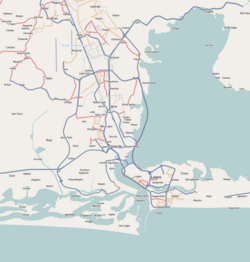| Ilojo Bar & Restaurant | |
|---|---|
 | |
| General information | |
| Architectural style | Afro-Brazilian Architecture |
| Location | Lagos Island, Lagos, Lagos State, Nigeria |
| Coordinates | 6°27′14″N3°23′24″E / 6.45385°N 3.38997°E |
| Completed | 1855 |
| Demolished | 11 September 2016 |
| Technical details | |
| Material | Burnt Bricks |

Ilojo Bar, also called Olaiya House or Casa da Fernandez, was a Brazilian-styled historic building located near Tinubu Square in Lagos Island, Lagos State, Nigeria. [1] [2]
Contents
According to some sources, the building was originally built as a bar and restaurant in 1855 by the Fernandez family, who employed returning ex-slaves from Brazil and Cuba that had mastered the art of building while in the Western Hemisphere. [3] [4] However, in her master's thesis at Leiden University, Dutch journalist Femke van Zeijl proved that the building consists of two different halves, built much later, between 1903 and 1914. The right-hand, slightly narrower half actually belonged to José Amoedo Fernandez, who came from Galicia and who was a trader, not a former slave. The left half, which was a bit wider and contained the future Ilojo Bar, belonged to a certain Vicente Guedes. In 1903, José Amoedo Fernandez acquired the second half of the building (the one that would become the Ilojo Bar) and remodelled it after its right half. According to van Zeijl, he sold the entire building to a certain Napoleon Rey Couto in 1914. [5]
Ilojo Bar was sold to Alfred Omolana Olaiya of the Olaiya family in 1933 and was declared a national monument in 1956 by the National Commission for Museums and Monuments. [4] [6]
